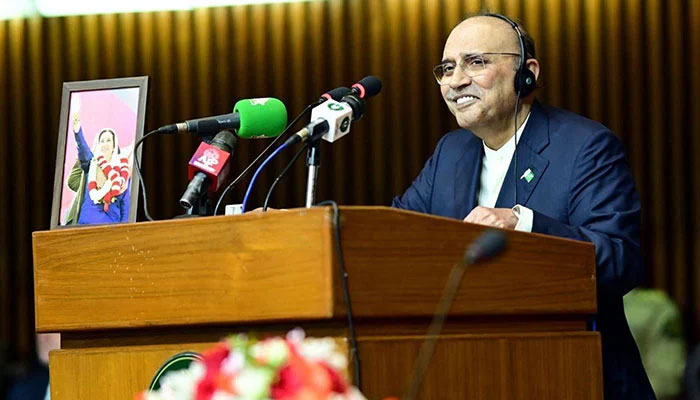Cautionary talk
President emphasises need to rebuild consensus to tackle extremism and militancy that supports such violence
President Asif Ali Zardari marked the beginning of the second parliamentary year through an address to the joint session of parliament -- and with that did a quick roundup of some of the key issues the country is facing. From reminding everyone about the continuation of the country’s democratic journey to emphasising the need for good governance, political stability and economic reforms, the symbol of the federation made a candid enough speech highlighting the importance of inclusive development, access to education and healthcare, and the need for tax reforms. One of the most pressing concerns he raised was the growing threat of extremism, which has long haunted Pakistan and is now drawing serious international consequences. President Zardari emphasised the need to rebuild a consensus to tackle extremist ideologies and the militancy that supports such violence. Given Pakistan's current situation, this was one of the most important points in his speech -- though he could have easily elaborated further. Over the decades, the state has either ignored or actively facilitated extremist narratives for political engineering. This has now come back to haunt us, with grave implications for our global reputation as well.
There have been reports suggesting that some Arab countries have complained about Pakistani individuals spreading extremist ideologies in their nations. Then there is Trump's America which is reportedly considering a travel ban on Pakistan -- apparently, due to security concerns. The recent arrests of Pakistan-origin individuals in Spain and Italy on terrorism-related charges just go on to show how radicalisation is no longer just a domestic issue but is also affecting Pakistanis abroad. If this continues, Pakistanis working anywhere abroad may face severe restrictions. That could lead to disastrous economic consequences, given our reliance on remittances from these regions. The problem is that for too long has extremism been either tolerated or actively encouraged by the state. Either due to patronage or fear, authorities have failed to call out attacks on religious minorities by extremist groups. Unless there is a firm and public commitment that extremism will no longer be tolerated at any level, Pakistan risks becoming a pariah state. Terrorism is a direct outcome of radicalisation, and if the state does not act decisively, the global backlash will be severe. Pakistan must strengthen its counterterrorism measures, regulate hate speech, and dismantle extremist networks before the situation worsens.
Another significant issue raised by President Zardari was the controversial Cholistan canal projec. Contrary to the government stance, he cautioned the federal government against its unilateral policies, warning that such decisions are causing a “grave strain on the federation". The president is obviously not a fan of the move to carve out more canals from the Indus River System despite strong opposition from federating units, and has said he will not be able to support this decision as president. Prime Minister Shehbaz Sharif has been assuring the PPP leadership that their concerns will be addressed, but the fact that the issue was raised so openly highlights the growing friction between the centre and the provinces. With Pakistan’s worsening water crisis, any decision that threatens Sindh’s water resources must be reconsidered. The country is already just coming out of a fragile economic crisis; politically things are yet to stabilise. Opening up such a new front and risking alienating allies would be terrible government strategy. The choices made today will shape the country’s future. The state must take immediate, concrete actions to curb extremism, protect minority rights and ensure sustainable development if it wishes to secure a future free from conflict and chaos.
-
 Record Set Straight On King Charles’ Reason For Financially Supporting Andrew And Not Harry
Record Set Straight On King Charles’ Reason For Financially Supporting Andrew And Not Harry -
 Michael Douglas Breaks Silence On Jack Nicholson's Constant Teasing
Michael Douglas Breaks Silence On Jack Nicholson's Constant Teasing -
 How Prince Edward Was ‘bullied’ By Brother Andrew Mountbatten Windsor
How Prince Edward Was ‘bullied’ By Brother Andrew Mountbatten Windsor -
 'Kryptonite' Singer Brad Arnold Loses Battle With Cancer
'Kryptonite' Singer Brad Arnold Loses Battle With Cancer -
 Gabourey Sidibe Gets Candid About Balancing Motherhood And Career
Gabourey Sidibe Gets Candid About Balancing Motherhood And Career -
 Katherine Schwarzenegger Shares Sweet Detail From Early Romance Days With Chris Pratt
Katherine Schwarzenegger Shares Sweet Detail From Early Romance Days With Chris Pratt -
 Jennifer Hudson Gets Candid About Kelly Clarkson Calling It Day From Her Show
Jennifer Hudson Gets Candid About Kelly Clarkson Calling It Day From Her Show -
 Princess Diana, Sarah Ferguson Intense Rivalry Laid Bare
Princess Diana, Sarah Ferguson Intense Rivalry Laid Bare -
 Shamed Andrew Was With Jeffrey Epstein Night Of Virginia Giuffre Assault
Shamed Andrew Was With Jeffrey Epstein Night Of Virginia Giuffre Assault -
 Shamed Andrew’s Finances Predicted As King ‘will Not Leave Him Alone’
Shamed Andrew’s Finances Predicted As King ‘will Not Leave Him Alone’ -
 Expert Reveals Sarah Ferguson’s Tendencies After Reckless Behavior Over Eugenie ‘comes Home To Roost’
Expert Reveals Sarah Ferguson’s Tendencies After Reckless Behavior Over Eugenie ‘comes Home To Roost’ -
 Bad Bunny Faces Major Rumour About Personal Life Ahead Of Super Bowl Performance
Bad Bunny Faces Major Rumour About Personal Life Ahead Of Super Bowl Performance -
 Sarah Ferguson’s Links To Jeffrey Epstein Get More Entangled As Expert Talks Of A Testimony Call
Sarah Ferguson’s Links To Jeffrey Epstein Get More Entangled As Expert Talks Of A Testimony Call -
 France Opens Probe Against Former Minister Lang After Epstein File Dump
France Opens Probe Against Former Minister Lang After Epstein File Dump -
 Last Part Of Lil Jon Statement On Son's Death Melts Hearts, Police Suggest Mental Health Issues
Last Part Of Lil Jon Statement On Son's Death Melts Hearts, Police Suggest Mental Health Issues -
 Leonardo DiCaprio's Girlfriend Vittoria Ceretti Given 'greatest Honor Of Her Life'
Leonardo DiCaprio's Girlfriend Vittoria Ceretti Given 'greatest Honor Of Her Life'




